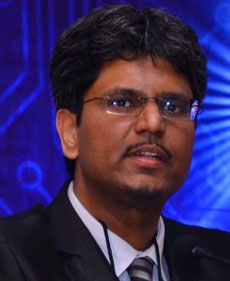DevOps is a set of practices that combines software development and IT operations. DevOps is the combination of cultural philosophies, practices, and tools that increases an organization's ability to deliver applications and services at high velocity: evolving and improving products at a faster pace than organizations using traditional software development and infrastructure management processes.
Why learn DevOps Automation Tool?
DevOps aims to
shorten the systems development life cycle
and provide continuous delivery with high software quality.
It is a
smart career option
in the present technical job market.
As per market research, Devops Engineer salary in India ranges between
₹ 4.2 Lakhs to ₹ 12.2 Lakhs
with an average annual salary of ₹ 6.0 Lakhs.
Duration
40 hours (22 hours theory and 18 hours lab) - 2 classes per week
Eligibility
Only Developer and IT Professional candidates can apply to this course.
Course Fees
Class Room Training
Rs.18,000/-
Inclusive of all taxes
Online Training
Rs.28,000/-
Rs.18,000/-
Inclusive of all taxes
What You Will Get?
40 Hours
of in depth training by the best automation tool experts
Study Materials
DevOps
Certificate of Completion after examination and alumni status
Course Benefits:
After doing this Module, the candidate will have a sound knowledge of Ansible, Jenkins, Kubernetes, Docker, Nagios Core 4, Syslog, HAproxy.
Course Details
- The duration of the course is 40 hours at 2 hours per week
- The course fee is Rs.18,000/- for classroom and Rs.28,000/- Rs.18,000/- for online
- The curriculum is taught combining theory and practice
- Understand DevOps (Day 1)
- Role of DevOps engineer (Day 1)
- What is Continuous Integration, Continuous Delivery, Continuous Deployment? (Day 1)
- What are enterprise network and infrastructure layouts and challenges? (Day 1)
- How many types of network architecture? (Day 1)
- What is cloud computing? (Day 2)
- What is IaaS, PaaS, SaaS? (Day 2)
- Understanding AWS Architecture (Day 2)
- What are EC2 instance and types and EC2 Pricing? (Day 2)
- EIP addressing Allocating, releasing (Day 2)
- Launch Linux Instance in AWS (Day 2)
- Connecting Linux instances from windows desktop and Linux machines (Day 2)
- What is Web Server? (Day 3)
- Describe Apache web server (Day 3)
- What is Apache?
- HTTP and HTTPS protocol
- Configure Vhost on Apache server
- What is Nginx server? How does it work? (Day 3)
- Difference between Apache and Nginx (Day 3)
- What is Reverse Proxy and Pass_proxy? (Day 3)
- What's Load Balancer? (Day 3)
- Load Balancing to Multiple Servers? (Day 3)
- Nginx Logging (Day 3)
- Installation and Configuration (Day 4)
- Understanding "global" section (Day 4)
- Modes – TCP vs. HTTP (Day 4)
- Load Balancing Algorithms (Day 4)
- Use HAProxy and share the load with round-robin policy (Day 4)
- Logging (Day 4)
- Configure the rsyslog daemon (Day 5)
- Understand standard facilities, priorities, and actions (Day 5)
- Configure log rotation (Day 5)
- Understand rsyslog (Day 5)
- Understand Remote logging and configure a test client (Day 5)
- Introduction (Day 6)
- Overview of version control systems (Day 6)
- Overview of Git (Day 6)
- What is Git (Day 6)
- Setting up a project (Day 6)
- Managing accounts (Day 6)
- Creating and Using the repository (Day 6)
- Installing on GIT client on Linux (Day 6)
- Cloning, check-in and committing (Day 6)
- Branching (Day 6)
- Creating the Branches, switching the branches, merging the branches (Day 6)
- Introduction (Day 7)
- Build Cycle (Day 7)
- Jenkins Architecture (Day 7)
- Obtaining and installing Jenkins (Day 7)
- Install and setup Jenkins (Day 7)
- Exploring Jenkins Dashboard (Day 7)
- Creating Jobs (Day 7)
- Running the Jobs (Day 7)
- Setting up the global environments for Jobs (Day 7)
- Adding and updating Plugins (Day 7)
- Disabling and deleting jobs (Day 7)
- Understanding Deployment (Day 7)
- Jenkins integration with GIT (Day 7)
- Jenkins to run script remotely (Day 7)
- Jenkins integration with Maven (Day 7)
- Jenkins pipelines (Day 7)
- Introduce Ansible (Day 8)
- Deploy Ansible (Day 8)
- Use modules (Day 8)
- Execute ad-hoc commands against servers (Day 8)
- Implement playbooks (Day 8)
- Implement Ansible Vault (Day 8)
- Write playbooks to Compile Apache (Day 8)
- Ansible Integration with Jenkins (Day 8)
- Nagios architecture (Day 9)
- Installing and configuring server components (Day 9)
- Users and Security (Day 9)
- Hosts and HostGroups (Day 9)
- Services and ServiceGroups (Day 9)
- Monitoring Linux servers with nrpe (Day 9)
- Install and Configure the NRPE
- Monitor Local Resource from Remote Nagios Server
- Define Nagios Commands
- Return Codes
- Configuring Notifications (Day 9)
- Creating Custom checks (Day 9)
- Introducing Docker (Day 10)
- Containerization Fundamentals (Day 10)
- Dockers vs. Virtualization (Day 10)
- Docker Architecture (Day 10)
- Creating Images (Day 10)
- Docker Volume (Day 10)
- Installing Docker on Linux (Day 10)
- Introducing DockerHub (Day 10)
- Creating an account on DockerHub
- Run a container
- Running commands in container (Day 10)
- Run multiple containers (Day 10)
- Remove the containers (Day 10)
- Customize Image and Upload to Docker Registry (Day 10)
- Publishing the Custom image (Day 10)
- Introduction (Day 11)
- Kubernetes Architecture - Overview (Day 11)
- Kubernetes Versus Docker Swarm (Day 11)
- Installing Kubernetes (Day 11)
- Setting Up a Single Node Kubernetes (Day 11)
- Deploying a Stand-Alone Application (Day 11)
Hacking Tutorials
Read All Tutorials »
Building a career in Digital Forensics - How promising is the future? A thorough career guide
Read Details »Hacking Videos
Explore All Videos »How to Hiding Your Secret File using Steganography?
View On Youtube »Enroll Now
Fields marked with * are mandatory.
Ratings & Reviews
Job Prospects & Job Sources
| IT Support SpecialistDevOps Engineer | CI/CD engineer |
| DevOps Cloud Engineer | DevOps Architect |
If you set out to build a career in DevOps, your career path in DevOps can see you start as a Release Manager, then move up to DevOps Test Engineer, DevOps Cloud Engineer, and finally, a DevOps Architect. This is the most upcoming technology in the current software and IT industry. DevOps Engineers are conversant with all the technical as well as IT operations aspects for integrated operations. DevOps offers a definite career path that promises steady growth. The future of DevOps is very promising, and many more companies are set to accept this methodology. DevOps methodologies are themselves changing with new tools and technologies coming in.
FAQs
- Module 1: Information of DevOps tool
- Module 2: AWS cloud Architecture
- Module 3: Web Server (Apache and Nginx)
- Module 4: Load Balancing with HAProxy
- Module 5: Log Server and rsyslog, Syslog
- Module 6: GIT Repositories, GITHUB, GITLAB
- Module 7: Jenkins
- Module 8: Ansible
- Module 9: Nagios core 4
- Module 10: Docker
- Module 11: Kubernetes
The duration of the course is 40 hours at 2 classes per week.
The course is administered in theory as well as practice.
Only Developer and IT Professional candidates can apply to this course.
Your career path in DevOps can see you start as a Release Manager, then move up to DevOps Test Engineer, DevOps Cloud Engineer, and finally, a DevOps Architect.
After doing DevOps, the candidate will get a job/promotion in top industries as in any position mentioned above.
Member of:








